| Article ID | Journal | Published Year | Pages | File Type |
|---|---|---|---|---|
| 4390978 | Ecological Engineering | 2009 | 24 Pages |
The emergy signature of the earth has changed dramatically over the past 250 years as a result of the development of technologies to use fossil fuels for human purposes. This change has resulted in the self-organization of modern industrial societies and their concomitant processes now dominate the earth. One such process is the transport of species from specific regions of the Earth, to which they were formerly confined, and their introduction to new territories. In this paper, we examine the role of exotic Spartina sp. in promoting the self-organization of coastal ecosystems for maximum empower on three coasts, Marlborough Sounds, NZ, Willapa Bay, WA, USA and Jiangsu Province, PRC. We found evidence to support the hypothesis that Spartina marsh maximizes empower through the building of new land in coastal environments that are dominated by an excess of sediment. Where excess sediments are present as a consequence of past geologic processes, and where a low marsh plant was absent, Spartina has been seen as an interloper to be destroyed. There is some evidence that given sufficient time, exotic Spartina marshes may increase productivity and diversity in these coastal systems, as well as those that are actively prograding.
